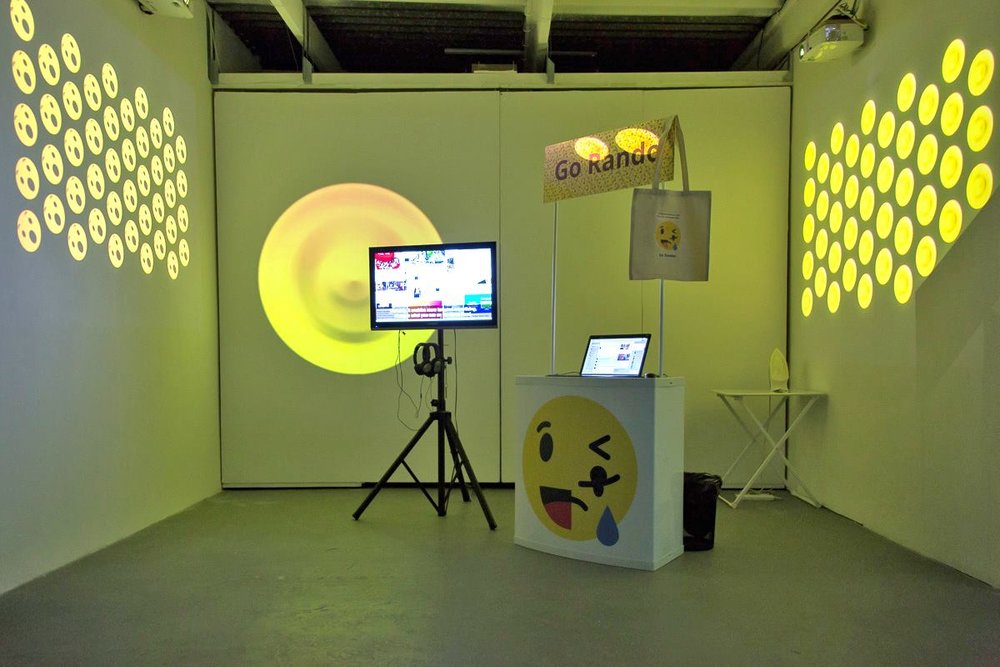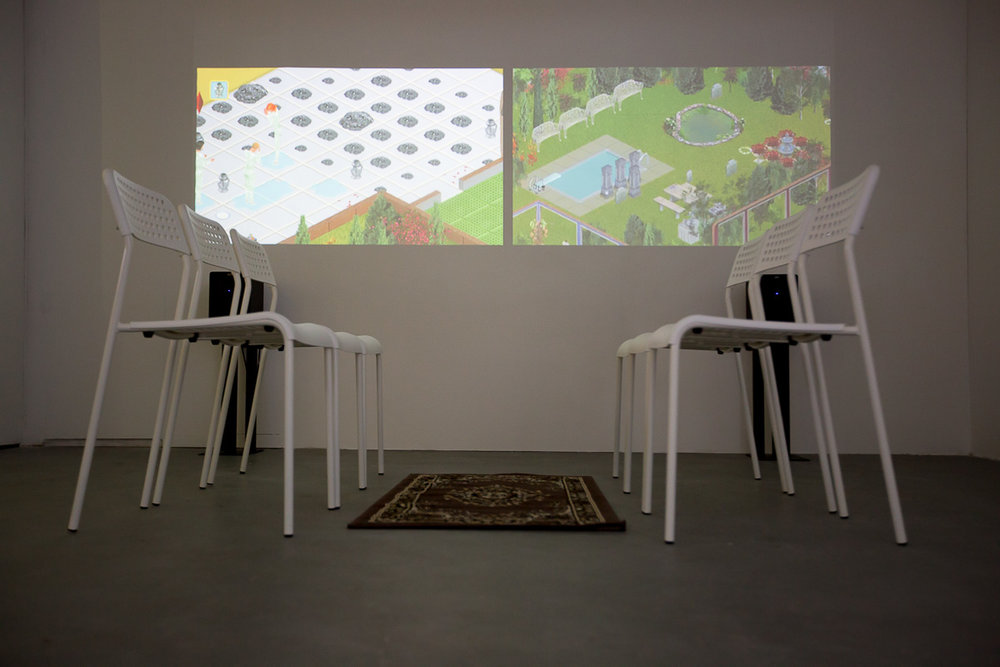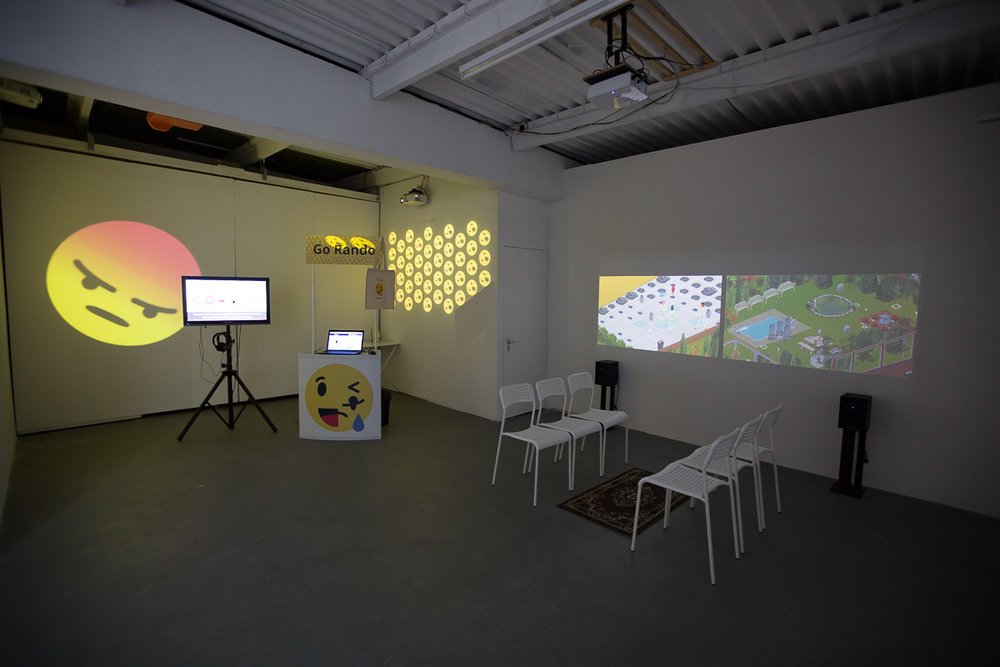Blinding Pleasures
featuring works by Man Bartlett, Ben Grosser and Angela Washko, guest curated by Filippo Lorenzin
Exhibition runs 10 Feb – 18 March 2017
EXHIBITION IMAGES | EXHIBITION BOOKLET
arebyte Gallery is pleased to present Blinding Pleasures, the first show launching its 2017 programme focusing on the theme of Control. The group exhibition Blinding Pleasures, curated by Filippo Lorenzin, will study the dangers and potentials of a conscious use of the mechanisms behind the False Consensus effect and its marketing-driven son, the so-called “Filter Bubble”. This project will be an occasion to reflect and question these issues with the involvement of artists, psychologists, lawyers, sociologists and communication experts.
The mornings after both the Brexit vote and the 2016 U.S Presidential Electron, social media was used more than ever for sharing sadness, fear and even desperation; people felt cheated, asking how it was possible that Brexit and Donald Trump won even though they saw on their social media feeds in the previous months that everyone was going to vote against them. The reality the social media channels perceived and the real and final outcome were too wide and deep.
Blinding Pleasures will explore the reasons and the ways in which the False Consensus effect takes place on a daily basis, online and offline, due to the construction of environments only allowing persons to connect with people who share a similar opinion. Not paying attention to signs that confound expectations is one of the most important and subtle functioning of human psyche; more often than not, it is an involuntary mechanism triggering out selfde-fense.
Marketing agencies and centres of power learnt how to master this bias for their interests. Shaping a public opinion doesn’t necessarily mean to filter the information needed to control the extremely partisan communities blind to other opinions but rather, and foremost, to sharpen the differences among opposite groups giving birth to extreme partly blinded communities. Blinding Pleasures is an exhibition that reflects on how people can critically take control over their inner psychological biases, disrupting the attempts of being misled by those who detain power on the platforms they use.
Ultimately, the exhibition questions the means in which one retains control over these systems. Starting from a non social media related point of view, the exhibition explores the perks and troubles of behaving in an environment designed to keep people locked in it by exploiting their need to be socially accepted and reassured. Given the complexity of the topic, inquiry won’t be from a wholly negative or positive presumption; it’ll be an opportunity to start a conversation aimed to collectively address subtle and influential psychological functioning.
Angela Washko shows Survival Rates In Captivity (Free Will Mode #5) (2017), a new unedited work of her ongoing project Free Will Mode. Free Will Mode is a series of videos in which the artist uses The Sims to place human artificial intelligence into architectural situations which test the constraints of their ability to rethink the environments they’ve been placed in. Despite the absurdity of these built architectural anomalies, they expose a greater cultural phenomenon within people – the extent to which we accept the hand we’ve been dealt (architecturally, politically, socially, economically).
Benjamin Grosser presents Go Rando (2017), a browser extension that obfuscates feelings on Facebook. Every time users click “Like”, Go Rando randomly chooses one of the six Facebook “reactions” for them. Want to see what Facebook feels like when your emotions are obscured? Go Rando.
Man Bartlett presents an installation titled Browsing the Blues (2017) created in part from the electromagnet output of his iPhone recorded while browsing his social media feeds, as well as a takeaway print that represents the score of the audio piece overlaid on a depiction of the circuitry of the iPhone model he used. In concert, this act as a sort of signature of his digital consumption.
Blinding Pleasures is launching arebyte’s 2017 programme surrounding and responding to the theme of Control as inspired by Deleuze’s Postscript for Societies of Control.
Accompanying the show is a series of events involving both experts and the general public in the conversation.
The first panel discussion will be held on Saturday 25 February with Professor of Sociology Amparo Lasén and Social Studies expert Ebru Yetiskin who will explain what is the False Consensus effects in terms of daily offline life. At the end of the event, Ebru Yetiskin will lead a workshop that will show the audience how easy it is to fall within these functions.
In the second talk, taking place on Saturday 18 March, lawyer Kevin Poulter, and NBC and The Creators Project (VICE) journalist Catherine Chapman will discuss how being trapped in a comfort zone influences our behaviours at work and the consequences of relying on our habits when we think about politics.
Along these events, we will screen Facebookistan (2016) directed by Jakob Gottschau, a documentary taking a close look at Facebook, its laws, powers and its influence on privacy and freedom of expression. The screening will take place on Saturday 11th March.
Filippo Lorenzin is a London-based independent curator and critical theorist. He has worked on many exhibitions, events and a lecture series focusing on the relaMon between socio-technological changes and art, based on a McLuhanian point of view. He collaborated in various ways with – among others - The Victoria & Albert Museum, Saatchi Gallery, Paris College of Art, La Biennale di Venezia, Goethe Institut and François Pinault Foundation.
Angela Washko is an artist, writer and facilitator devoted to creating new forums for discussions of feminism in spaces frequently hostile toward it. Since 2012, Washko has operated The Council on Gender Sensitivity and Behavioral Awareness in World of Warcraft, an ongoing intervention inside the most popular online role-playing game of all time. A recent recipient of a Franklin Furnace Performance Fund Grant, a Frank-Ratchye Fund for Art at the Frontier Grant from the STUDIO for Creative Inquiry, and a Rhizome Internet Art Microgrant, Washko’s practice has been highlighted in Art in America, Frieze Magazine, Time Magazine, The Guardian, Artforum, ARTnews, The Hairpin, VICE, Hyperallergic, Rhizome, the New York Times, Neural Magazine and more. Her projects have been presented nationally and internationally at venues including Kiasma Museum of Contemporary Art (Helsinki), Los Angeles Museum of Contemporary Art, the Milan Design Triennale, the Shenzhen Independent Animation Biennial and the Rotterdam International Film Festival. angelawashko.com
Benjamin Grosser creates interactive experiences, machines, and systems that examine the cultural, social, and political implications of software. Recent exhibition venues/festivals include Eyebeam in New York, the PLUNC Festival in Lisbon, Museum Ludwig in Cologne, and Galerie Charlot in Paris. His works have been featured in Wired, The Atlantic, The Guardian, Hyperallergic, Neural, El País, Al Jazeera, and Der Spiegel. The Chicago Tribune called him the “unrivaled king of ominous gibberish.” Slate referred to his work as “creative civil disobedience in the digital age.” Grosser’s recognitions include First Prize in VIDA 16, the Expanded Media Award for Network Culture from Stuttgarter Filmwinter, and a Rhizome net art grant. His writing about art and technology has been published in journals such as Computational Culture, Media-N, and Big Data and Society (forthcoming). Grosser is an assistant professor at the University of Illinois (USA), and a faculty affiliate at the National Center for Supercomputing Applications where he co-founded the Software Recomposition Lab. bengrosser.com
Man Bartlett is a multidisciplinary artist who lives and works in New York. His diverse practice includes sound, drawing, collage, video, performance and digital projects that oVen use online plaaorms as outlets for playful yet subversive social critique. Bartlett has exhibited or performed in a variety of venues including: The Victoria & Albert Museum, his tiny windowless bedroom, The Brooklyn Museum, a Best Buy store, Freies Museum (Berlin), Eyebeam (New York), Flux Factory (Long Island City), iMOCA (Indianapolis), Port Authority Bus Terminal, the Boulder Museum of Contemporary Art, Winkleman Gallery, and the Whitney Museum of American Art, among many others. www.manbartlett.com




